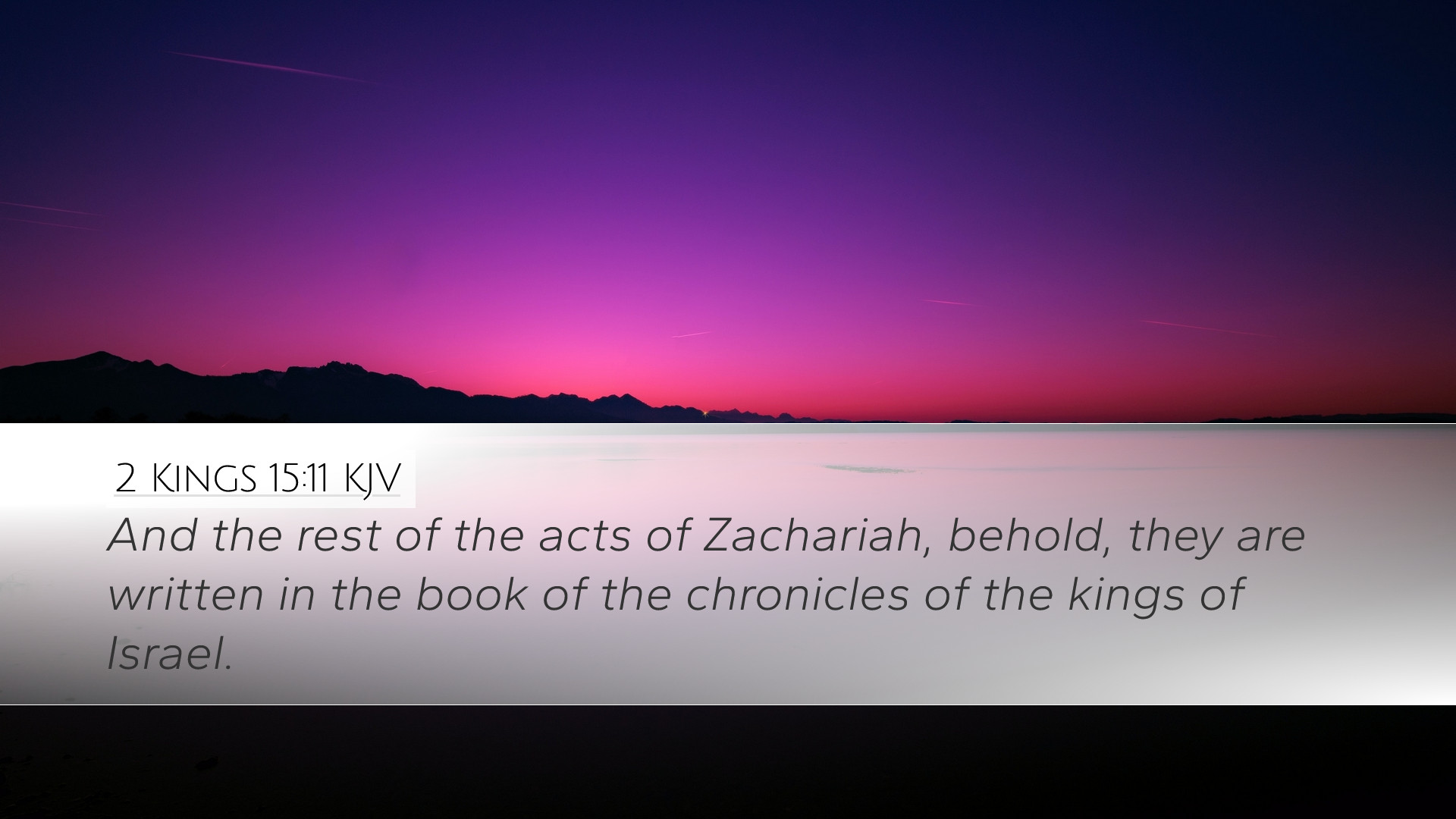Commentary on 2 Kings 15:11
Verse: "Now the rest of the acts of Azariah, and all that he did, are they not written in the book of the chronicles of the kings of Judah?" (2 Kings 15:11)
Introduction
This brief mention in 2 Kings 15:11 highlights the conclusion of Azariah's reign, pointing readers to another source for greater detail on his life and rule. As with many such verses throughout the historical books, it serves as a literary device to guide the reader to more comprehensive accounts found in the "Chronicles." The verse encapsulates the nature of the biblical historical record—short, poignant, and often demanding further investigation.
Insights from Public Domain Commentaries
Matthew Henry's Commentary
Matthew Henry emphasizes the importance of royal deeds and their documentation within the annals of the kingdom. He notes that this verse not only recalls the achievements of Azariah but also serves as a reminder of the broader historical context. Henry states:
"The acts of great persons are often a reflection of their times; Azariah's reign is no exception. His accomplishments must be viewed in light of both the political climate and his adherence to divine law."
Albert Barnes' Notes on the Bible
Albert Barnes draws attention to the significance of the "book of the chronicles of the kings of Judah," suggesting that it includes official records that document the faithfulness or failures of the kings. He underscores the notion of accountability in leadership:
"The chronicler’s work captures a compilation of the actions and decisions of the monarchs, thus ensuring that history bears evidence of their allegiance to God and His covenant. Azariah, while noted for his positive advancements, ultimately faced divine judgment due to the sins he allowed to persist.”
Adam Clarke's Commentary
Adam Clarke provides a more nuanced view, analyzing the implications of Azariah's reign through the lens of both his accomplishments and shortcomings. Clarke notes that this verse signifies a summation that reflects on Azariah's character:
"His tenure was marked by significant developments, both militarily and geographically; however, his personal failings remind us that even righteous leaders can falter. The narrative invites reflection on the long-term effects of one's decisions and the chronicled record of those choices."
Theological Implications
This verse, while succinct, invites deeper theological reflection. The mention of the chronicles implies a divine oversight in the historical unfolding of Israel's monarchy. All actions, righteous or unrighteous, are under divine scrutiny. Pastors and theologians are reminded of the following key points:
- The Sovereignty of God: The course of history is guided by God; every reign is under His ultimate authority.
- The Importance of Historical Records: Biblical history is essential for understanding God's covenantal relationship with His people.
- Leadership Accountability: Leaders are accountable for their actions and the legacy they leave behind, influencing generations to come.
Applicational Insights
For pastors preaching from this text, the implications of accountability and leadership are profound. Consider reflecting on how the lives and decisions of leaders today—both secular and spiritual—impact community faithfulness and health. Furthermore, exploring the concept of legacy can encourage congregants to consider how their actions shape future generations:
- Encourage Transparency: Just as ancient records hold rulers accountable, modern leaders should be transparent in their decisions.
- Foster a Culture of Reflection: Creating space for personal and communal reflection on actions—aligned with divine principles—can help in fostering spiritual growth.
- Reinforce God’s Faithfulness: Regardless of human error, God’s faithfulness remains unshaken, offering hope and redemption.
Conclusion
2 Kings 15:11 serves as a poignant reminder of the complex interplay between leadership, accountability, and divine sovereignty. As we study this and similar verses, we are invited into a deeper understanding of how individual actions resonate throughout history, eternally documented in the annals of God's plan for His people.


